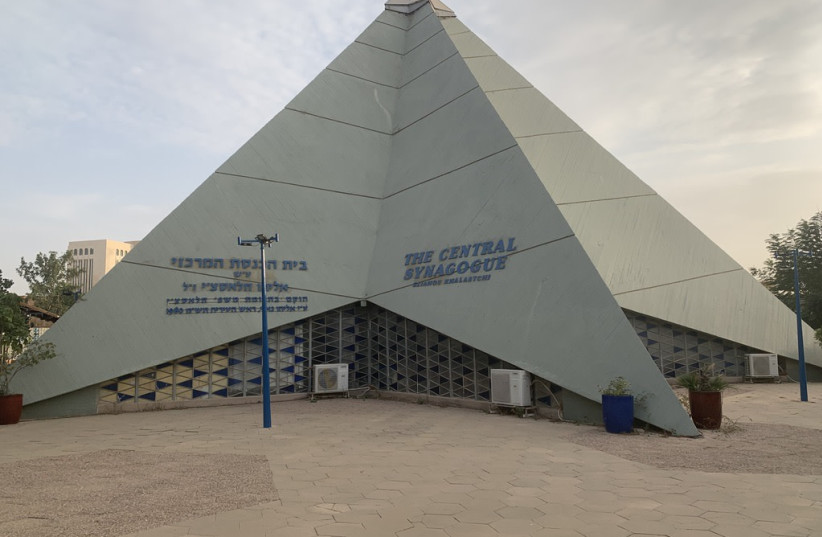For more than 2,500 years, Baghdad was home to one of the most vibrant and historically significant Jewish communities in the world. This ancient Jewish community is now extinct – ethnically cleansed, persecuted and expelled from the country in the 20th century, when they were stripped of their citizenship, property and possessions.
The Jewish cultural treasures of this community – which have been preserved in the Iraqi Jewish Archive, an invaluable collection of tens of thousands of books, artifacts and documents that have not been fully or properly inventoried or digitized – are now at grave risk at the hands of an Iraqi government that has criminalized relations with Jewish people.
The US government acquired the Iraqi Jewish Archive days after coalition forces took over Baghdad in May 2003. American soldiers entered the flooded building of Saddam Hussein’s intelligence agency, the Mukhabarat. In the basement, under four feet of water, they found tens of thousands of confiscated Jewish books, artifacts and documents – materials that had been seized from synagogues, schools and other Jewish institutions.
On August 20, 2003, the US Coalition Provisional Authority (CPA), which was dissolved in 2004, signed an agreement with the US National Archives and Records Administration (NARA) that the items would be restored by NARA, but it left open their ultimate future. No Iraqis or Iraqi Jews were consulted when agreements determining the future of the archive were made. This collection has not even been fully examined by a rabbinical scholar and could contain highly important Jewish manuscripts like the Aleppo Codex.
For years, our organization, JIMENA: Jews Indigenous to the Middle East and North Africa, and many other organizations representing the interests of the Jewish people, have petitioned the US government to not return the archive to Iraq as it is ultimately the patrimony of Iraqi Jews and not the government of Iraq, which eradicated its Jewish population. Iraq has no Jews and no official interest in rebuilding relationships with its exiled Jewish community. To the contrary, the Iraqi government’s antisemitic hostilities toward the Jewish people has intensified greatly in recent months.
In May, the Iraqi parliament passed a law that criminalizes relations with Israel and interactions with Israelis, violations of which are punishable by life in prison or even death for Iraqis. It so happens that the vast majority of Iraqi Jews live in Israel. So how would Iraqi Jews, who are closely connected to the Jewish state, have access to their patrimony as embodied by this archive? As the State Department admonished, this law promotes “an environment of antisemitism.”
Why was the antisemitic law passed?
Of note, it is speculated that this antisemitic Iraqi law was a reaction to a proposed law in favor of compensation to Jews whose property had been unjustly confiscated. The compensation law would be a blow to Iranian-backed militias in Iraq, which use the proceeds from falsified Jewish property deeds worth millions of dollars to finance their terrorist activities.
As is well known, the Iranian’s regime’s deep and pernicious influence in Iraq makes any kind of normalization with Israel or the Jewish Diaspora impossible, and it highly likely influenced the passage of the criminalization law.
The US government has long promised the Jewish community accessibility to properties confiscated from ethnically cleansed Jewish communities of the Middle East, but that promise hasn’t even been delivered while the archive has been on US territory. Iraqi and Middle Eastern Jewish leaders and scholars in the US have been barred from full access to the archive, despite the fact that the archive contains documents once owned by our family members and communities. If sent back to Iraq, accessibility will be irreparably lost.
This follows a trend of the US Department of State signing cultural property agreements with antisemitic Middle Eastern governments. These agreements essentially validate those countries’ confiscations of Jewish properties while simultaneously denying Jews and other oppressed religious communities’ access to their confiscated properties.
Backed by a powerful archaeological lobby, at the end of July, the State Department met to consider a renewal of a cultural property agreement with Libya whose ambiguous language appeared to recognize Torah scrolls and sacred Jewish materials as the national heritage of the failed Libya government. Our hope is to see all future MOUs include clear carve-out language that would protect Jewish property. While the Department of State promises accessibility to our properties, we continue to bemoan its desecration and destruction.
This is not simply a matter of doing what is right, but it is a matter of respecting basic international law. Article 17 of the Universal Declaration of Human Rights states no one (individual or community) should be deprived of their property. The fact that the Iraqi government possessed the Iraqi Jewish collection was because it deprived its Jewish citizens of its rightful property. Returning the archive to Iraq would only perpetuate that crime and further violate the Universal Declaration of Human Rights.
Based on the ethnic cleansing and persecution that Iraqi Jews faced at the hands of the Iraqi government and the current Iranian-dominated reality in Iraq, the US government must once and for all review its ambiguous agreement with the CPA and NARA and return the Iraqi Jewish Archive to Iraqi Jews. We are truly grateful for all the US government has done to protect, preserve and restore the Iraqi Jewish Archive, which otherwise would have been lost. We urge the government to continue this legacy of guardianship and return it to its rightful owners: the Jews of Iraq.
Carole Basri, a lawyer, filmmaker, and descendant of Iraq Jews, was a member of the State Department’s Future of Iraq Project, an assistant counsel with the Senate Antitrust and Monopoly Subcommittee and an attorney with the Federal Trade Commission.
Sarah Levin is executive director of JIMENA: Jews Indigenous to the Middle East and North Africa, an organization dedicated to achieving universal recognition for the heritage, history and rights of Middle Eastern and North African Jewish refugees and their descendants.

